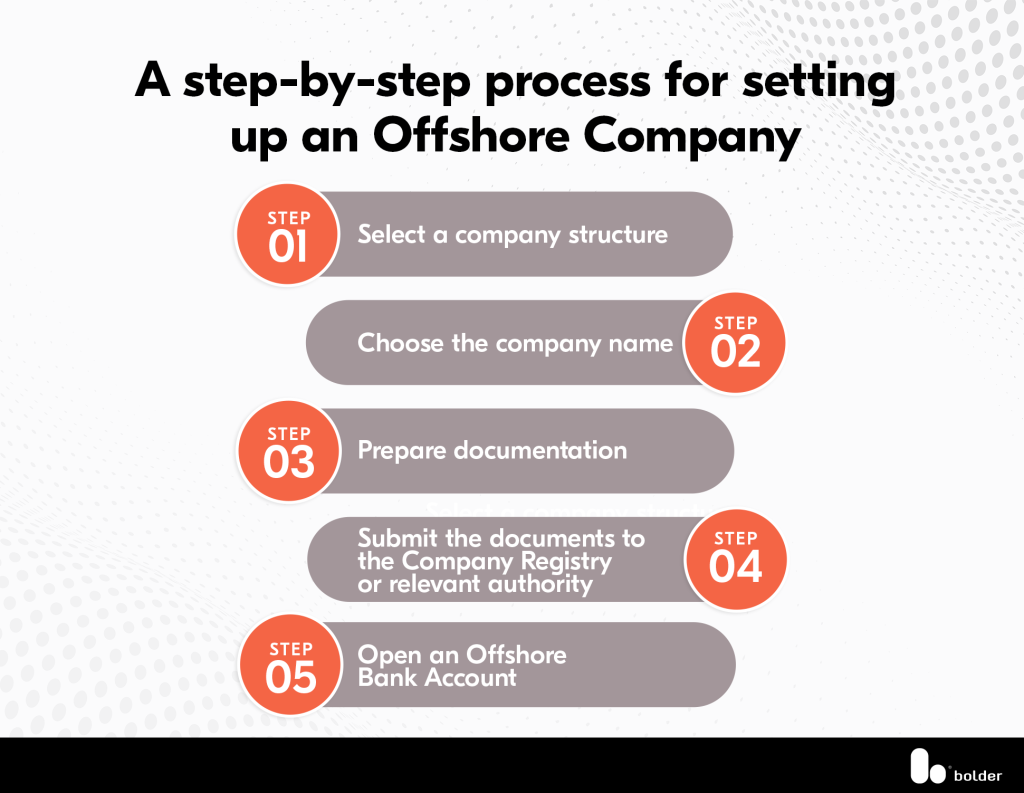Offshore Company Formations: Methods to Boost Legal and Tax Benefits
Wiki Article
Comprehending Offshore Business Formations: A Comprehensive Overview to the Process and Benefits
Offshore business formations offer a tactical method for entrepreneurs looking for to enhance their business operations. These entities often offer advantages such as tax obligation benefits, raised privacy, and robust property protection. However, recognizing the intricacies of choosing a jurisdiction, the development process, and conformity demands is important. As the landscape of global organization develops, the ramifications of developing an overseas firm warrant careful factor to consider. What actions should one require to navigate this complicated surface?What Is an Offshore Firm?
An offshore business is an organization entity integrated outside the territory of its owners' home, frequently in a country with desirable regulatory and tax obligation settings. These firms can serve various purposes, including asset security, worldwide trading, and riches monitoring. They are usually developed in jurisdictions called tax obligation places, where company tax obligation prices are reduced or missing, and privacy regulations are rigid.Offshore firms might be owned by people or various other company entities and can run in various sectors, including finance, consulting, and e-commerce. While they use specific benefits, the regulative and lawful frameworks controling offshore companies differ considerably by territory. Organization owners have to browse these complexities to guarantee compliance with both global and regional regulations. Understanding the framework and function of offshore firms is crucial for people considering this option for business procedures or possession monitoring.
Advantages of Creating an Offshore Business
While the choice to create an overseas company might originate from numerous strategic factors to consider, the possible benefits are compelling for lots of local business owner. One considerable benefit is tax optimization; many overseas jurisdictions provide beneficial tax rates and even tax exemptions, permitting business to maintain more earnings. Furthermore, offshore companies frequently offer enhanced personal privacy defense, protecting the identities of investors and supervisors from public scrutiny.

Finally, company owner might discover functional flexibility, as offshore jurisdictions regularly have fewer regulatory hurdles, allowing streamlined monitoring and administration. Collectively, these benefits make overseas business formations an appealing option for several looking for to expand their service horizons.
Choosing the Right Jurisdiction
Choosing the ideal jurisdiction for an overseas business is a crucial action in making best use of the advantages described earlier. Different factors affect this choice, consisting of tax regulations, corporate laws, and the total company setting. Jurisdictions such as the British Virgin Islands, Cayman Islands, and Singapore are typically preferred for their desirable tax obligation regimens and durable legal structures.It is essential to take into consideration the particular requirements of business, such as personal privacy demands and regulatory conformity. In addition, the simplicity of operating, including the efficiency of company enrollment and financial facilities, plays a considerable role.
Prospective proprietors need to also examine the political stability and reputation of the selected territory, as these elements can influence long-lasting success. Ultimately, complete study and specialist examination are advised to ensure positioning with the company's objectives and to leverage the full capacity of overseas advantages.

The Offshore Firm Formation Process
The offshore business development process involves a series of necessary steps that need mindful planning and execution. People or companies have to choose a suitable territory that aligns with their objectives, thinking about variables such as tax benefits, privacy, and governing environment. Following this, the following action involves picking the suitable service framework, such as an International Business Company (IBC) or Minimal Obligation Business (LLC)When the structure is identified, needed documents, including a business strategy, identification, and proof of address, need to be prepared. Involving a reliable neighborhood representative or provider can enhance this stage, guaranteeing compliance with neighborhood laws. After sending the called for documentation to the pertinent authorities, the development process generally culminates in the issuance of a certification of consolidation. This document develops the business as a lawful entity, allowing it to perform service worldwide.
Lawful Requirements and Conformity
Comprehending the lawful needs and compliance obligations is important for any person looking to develop an overseas firm. Each jurisdiction has details policies that should be complied with, which can consist of company enrollment, obtaining essential licenses, and preserving local addresses. Offshore Company Formations. It is essential to appoint a signed up representative that can promote interaction with neighborhood authorities and warranty conformity with ongoing coverage needsFurthermore, several jurisdictions require the submission of yearly monetary declarations, along with tax filings, also if the firm does not create revenue. Shareholders and supervisors have to be identified, with due diligence treatments often mandated to confirm their identities. Failure to fulfill these legal obligations can result in penalties or the dissolution of the company. Therefore, possible offshore firm owners should seek advice from attorneys experienced in worldwide business legislation to browse these intricacies effectively and guarantee site link complete conformity with all laws.
Tax Obligation Ramifications of Offshore Companies
The tax obligation implications of offshore companies present significant advantages that attract several entrepreneurs. Recognizing the linked compliance demands is vital for navigating the complexities of global tax regulations. This section will explore both the prospective advantages and the necessary obligations connected to overseas service structures.Tax Benefits Overview
Overseas firms are commonly watched with suspicion, they can offer significant tax advantages for companies and individuals looking for to enhance their financial strategies. One of the main advantages is the possibility for lower company tax obligation prices, which can bring about significant cost savings. Several offshore territories provide positive tax programs, including absolutely no or minimal tax on revenues, capital gains, and inheritance. Furthermore, offshore companies can facilitate global organization procedures by minimizing tax obligations associated with cross-border purchases. This structure may likewise make it possible for tax deferral chances, allowing earnings to grow without immediate taxes. Ultimately, these benefits add to enhanced monetary effectiveness and property security, making offshore firms an appealing option for savvy investors and entrepreneurs.Compliance Demands Discussed
Offshore business might offer tax obligation advantages, yet they likewise include a set of compliance needs that must be carefully browsed. These entities undergo specific reporting obligations, which differ greatly depending on the jurisdiction. Normally, overseas business must preserve exact financial documents and submit yearly monetary declarations to comply with local guidelines. In addition, many jurisdictions require the disclosure of helpful possession to combat money laundering and tax evasion. Failure to comply with these compliance measures can result in extreme fines, including penalties and potential loss of organization licenses. Understanding the local tax obligation regulations and international arrangements is important, as they can impact tax liabilities and overall operational legality. Involving with financial and legal specialists is suggested to guarantee full conformity.Keeping and Handling Your Offshore Firm
Maintaining and managing an overseas business includes adhering to different continuous compliance requirements vital for legal procedure. This consists of thorough financial document maintaining and an understanding of tax obligation responsibilities relevant to the company's territory. Effective administration not only guarantees governing conformity but additionally sustains the company's economic health and wellness and longevity.Recurring Compliance Requirements
Assuring ongoing conformity is essential for any type of entity operating in the offshore field, as failure to satisfy regulative requirements can bring about considerable penalties or perhaps dissolution of the business. Offshore firms need to abide by regional legislations, which might consist of annual filing of monetary declarations, payment of essential costs, and preserving a licensed office address. In addition, companies are often needed to appoint a regional representative or representative to assist in interaction with authorities. Regular updates on modifications in regulation or tax needs are vital for conformity. Adherence to anti-money laundering (AML) and know-your-customer (KYC) guidelines is check these guys out vital. By maintaining arranged documents and staying educated, overseas firms can guarantee they remain compliant and alleviate threats connected with non-compliance.Financial Record Keeping
Effective monetary document maintaining is important for the successful management of any type of offshore business. Keeping exact and detailed monetary documents help in tracking the business's efficiency, ensuring conformity with neighborhood regulations, and assisting in notified decision-making. Business must carry out methodical procedures for documenting earnings, costs, and purchases to develop transparency and responsibility. Making use of accountancy software program can simplify this procedure, permitting real-time economic evaluation and reporting. Routinely evaluating monetary declarations aids recognize patterns, examine productivity, and take care of cash flow effectively. It is essential to securely save these documents to safeguard sensitive details and guarantee very easy gain access to during audits or monetary testimonials. By prioritizing meticulous economic record maintaining, overseas companies can improve operational efficiency and support lasting success.Tax Obligations Review
Comprehending tax obligations is essential for the correct monitoring of an offshore company, as it directly influences monetary efficiency and conformity. Offshore companies might be subject to numerous tax regulations depending upon their territory, including corporate tax obligations, value-added tax obligations, and withholding taxes. It is imperative for company owner to stay notified concerning their tax responsibilities, as failure to conform can bring about charges and legal concerns. Furthermore, many overseas jurisdictions use tax rewards, which can significantly profit businesses if browsed properly. Engaging a well-informed tax expert or accountant focusing on worldwide tax obligation law can assist ensure that firms meet their responsibilities while maximizing their tax methods. Inevitably, diligent tax administration adds to the general success and sustainability of an offshore entity.Frequently Asked Inquiries
Can I Open a Checking Account for My Offshore Firm Remotely?
The capability to open up a bank account for an overseas firm from another location depends upon the financial institution's plans and the jurisdiction's guidelines. Many financial institutions offer remote services, yet certain demands may differ substantially in between establishments.What Are the Expenses Associated With Forming an Offshore Firm?
The prices entailed in developing an overseas business generally consist of enrollment charges, legal and consulting expenses, and ongoing upkeep fees. These costs vary significantly based on territory, complexity of the service structure, and specific solutions required.Are There Restrictions on Who Can Be an Investor?
Restrictions on shareholders differ by jurisdiction. Some nations may impose restrictions based upon residency, citizenship, or company type - Offshore Company Formations. It's important for potential investors to research study specific guidelines suitable to their picked offshore placeHow Long Does the Offshore Business Development Process Typically Take?
The overseas company development process commonly takes in between a few days to a number of weeks. Elements affecting the timeline consist of territory needs, document preparation, and responsiveness of appropriate authorities entailed in the registration process.What Takes place if I Fail to Abide By Regional Regulations?
Failure to abide with neighborhood legislations can lead to extreme fines, consisting of fines, lawful action, or loss of business licenses - Offshore Company Formations. It might additionally harm the business's track record and prevent future organization chances in the territoryAn offshore business is an organization entity learn the facts here now incorporated outside the jurisdiction of its owners' residence, frequently in a country with desirable governing and tax settings. One significant advantage is tax obligation optimization; numerous offshore territories offer desirable tax obligation rates or also tax obligation exemptions, allowing firms to keep more profits. Overseas business are usually watched with skepticism, they can offer considerable tax obligation benefits for services and individuals seeking to optimize their monetary approaches. Additionally, overseas business can help with international organization procedures by decreasing tax obligation responsibilities associated with cross-border purchases. Offshore firms may be subject to numerous tax regulations depending on their jurisdiction, consisting of business taxes, value-added taxes, and withholding tax obligations.
Report this wiki page